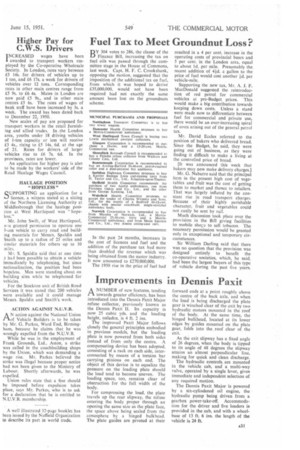Fuel Tax to Meet Groundnut Loss?
Page 33

If you've noticed an error in this article please click here to report it so we can fix it.
BY 304 votes to 286, the clause of the Finance Bill, increasing the tax on fuel oils was passed through the committee stage in the House of Commons, last week. Capt. H. F. C. Crookshank, opposing the motion, suggested that the imposition of the additional tax on fuel, from which it was hoped to derive £35,000,000, would not have been required had not exactly the same amount been lost on the groundnuts scheme.
In the past 24 months, increases in the cost of licences and fuel and the addition of the purchase tax had more than doubled the revenue which was being obtained from the motor industry. It now amounted to £270,000,000.
The 1950 rise in the price of fuel had resulted in a 4 per cent. increase in the operating costs of provincial buses and 5 per cent. in the London area, equal to about Id. per mile. Presumably the. recent addition of 44d. a gallon to the price of fuel would cost another id. per vehicle-mile.
Supporting the new tax, Mr. A. J. F. MacDonald suggested the reintroduction of red petrol for commercial vehicles at pre-Budget. prices. This would make a big contribution towards keeping down costs. Unless a stand were made now to differentiate between fuel for commercial and private use, there would be an ever-increasing spiral of costs arising out of the general petrol tax.
Mr. David Eccles referred to the position of bakers who delivered bread. Since the Budget, he said, they were going out of business, as they were finding it difficult to make a living at the controlled price of bread.
[It was announced this week that bakers may now make delivery charges.] Mr. G. Nabarro said that the principal item in the present high cost of vegetables and fruit was the cost of getting them to market and thence to retailers. That was largely inflated by the constant rise in road transport charges. Because of their highly perishable character, fruit and vegetables could not easily be sent by rail.
Much discussion took place over the provision in the Bill giving facilities to mobile shoes to sell tobacco. The necessary permission would be granted only in exceptional and temporary circumstances.
Sir William Darling said that there was no question that the provision was designed entirely to benefit the co-operative societies, which, he said, had been the largest buyers of this type of vehicle during the past five years.




























































































